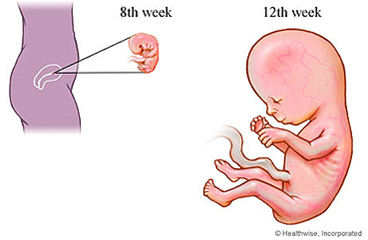Weeks 10 to 12 of Your Pregnancy

By weeks 10 to 12 of your pregnancy, the placenta has formed inside your uterus. It may be possible to hear your baby's heartbeat with a special ultrasound device. This is the perfect time to think about an alpha fetoprotein (AFP) test. This test can tell you if you are more at risk for having a baby with birth defects. It is also not too soon to think about breast-feeding your baby after it is born. Only you know your feelings about breast-feeding. But it is important to learn about the benefits of breast-feeding. Several changes in your body can occur during these few weeks. You may notice changes in your appetite, energy level, moods, or the way your breasts look and feel. You may feel dizzy or have headaches, vaginal discharge, nosebleeds, or a stuffy nose. These are normal, often temporary, changes. Although some of these changes may be uncomfortable, this care sheet can help you take steps to feel more comfortable.
Follow-up care is a key part of your treatment and safety. Be sure to make and go to all appointments, and call your doctor if you are having problems. It’s also a good idea to know your test results and keep a list of the medicines you take.
How can you care for yourself at home?
Decide about an alpha fetoprotein (AFP) test
- An AFP is a blood test done between the 15th and 20th weeks of pregnancy. Talk to your doctor if you want to have it.
- The test can tell you if you are more at risk for having a baby with birth defects. The test screens for:
- Problems with how the spine, brain, belly, or bowels form.
- Down syndrome and Trisomy 18. These conditions cause mental and physical problems.
- If you have a positive AFP result, it does not mean that your baby has a problem. But your doctor will want to watch your pregnancy closely and talk to you about next steps.
Ease discomfort
- Slow down and take naps when you feel tired.
- If your emotions swing, talk to someone. Crying, anxiety, and concentration problems are common.
- If your gums bleed, try a softer toothbrush. If your gums are puffy and bleed a lot, see your dentist.
- If you feel dizzy:
- Get up slowly after sitting or lying down.
- Drink plenty of fluids.
- Eat small snacks to keep your blood sugar stable.
- Put your head between your legs as though you were tying your shoelaces.
- Lie down with your legs higher than your head. Use pillows to prop up your feet.
- If you have a headache:
- Lie down.
- Ask your partner or a good friend for a neck massage.
- Try cool cloths over your forehead or across the back of your neck.
- Take 1 or 2 regular-dose tablets of acetaminophen (Tylenol) every 4 to 6 hours. Do not take aspirin or migraine medicine unless your doctor says it is okay.
- Treat a yeast infection if you get one. Thick, whitish vaginal discharge is normal. But if the discharge itches, burns, or looks like cottage cheese, you may have a yeast infection. To treat a yeast infection:
- Use over-the-counter products, such as Monistat or Gyne-Lotrimin, for the infection.
- Use 1% hydrocortisone cream for itching.
- When you take a bath or shower, wash and rinse carefully.
- Wear cotton underwear, change it often, and be sure it is dry.
- If you have a nosebleed, pinch your nose gently, and hold it for a short while. To prevent nosebleeds, try massaging a small dab of petroleum jelly, such as Vaseline, in your nostrils.
- If your nose is stuffed up, try saline (saltwater) nose sprays. Do not use decongestant sprays.
Care for your breasts
- Wear a bra that gives you good support.
- Know that changes in your breasts are normal.
- Your breasts may get larger and more tender. Tenderness usually gets better by 12 weeks.
- Your nipples may get darker and larger, and small bumps around your nipples may show more.
- The veins in your chest and breasts may show more.
- Do not worry about "toughening'" your nipples. Breast-feeding will naturally do this.
Consider breast-feeding
- Experts recommend that women breast-feed for 1 year or longer. Breast milk is the perfect food for babies.
- Breast milk is easier for babies to digest than formula, and is always available, just the right temperature, and free.
- In general, babies who are breast-fed are healthier than formula-fed babies.
- Breast-fed babies are less likely to get ear infections, colds, diarrhea, and pneumonia.
- Breast-fed babies who are fed only breast milk are less likely to develop asthma and allergies.
- Breast-fed babies are less likely to be obese or develop diabetes or heart disease.
- Women who breast-feed bleed less after birth. Their uteruses also shrink back faster.
- Some women who breast-feed lose weight faster. Making milk burns calories.
- Breast-feeding can lower your risk of breast cancer, ovarian cancer, and osteoporosis.

